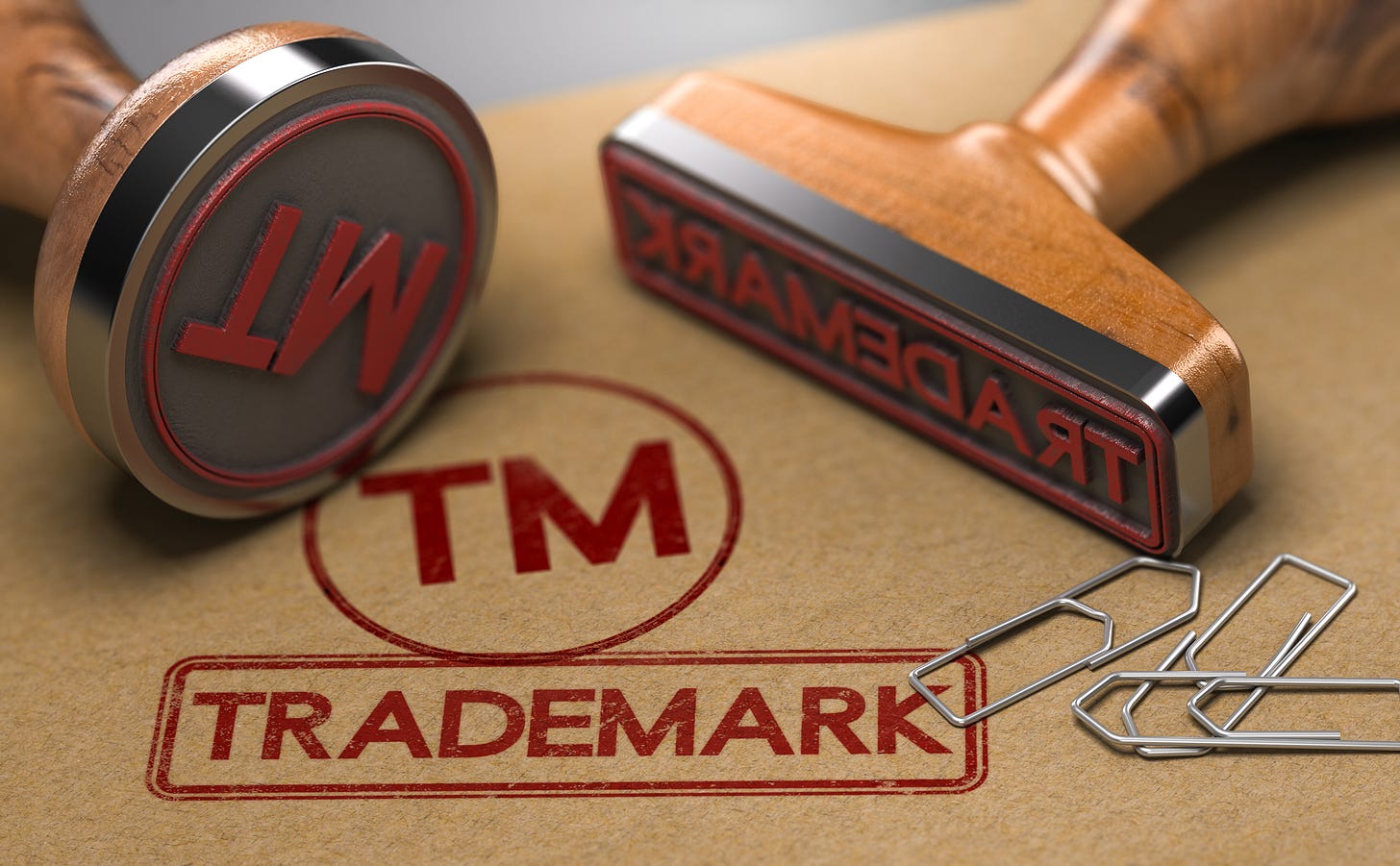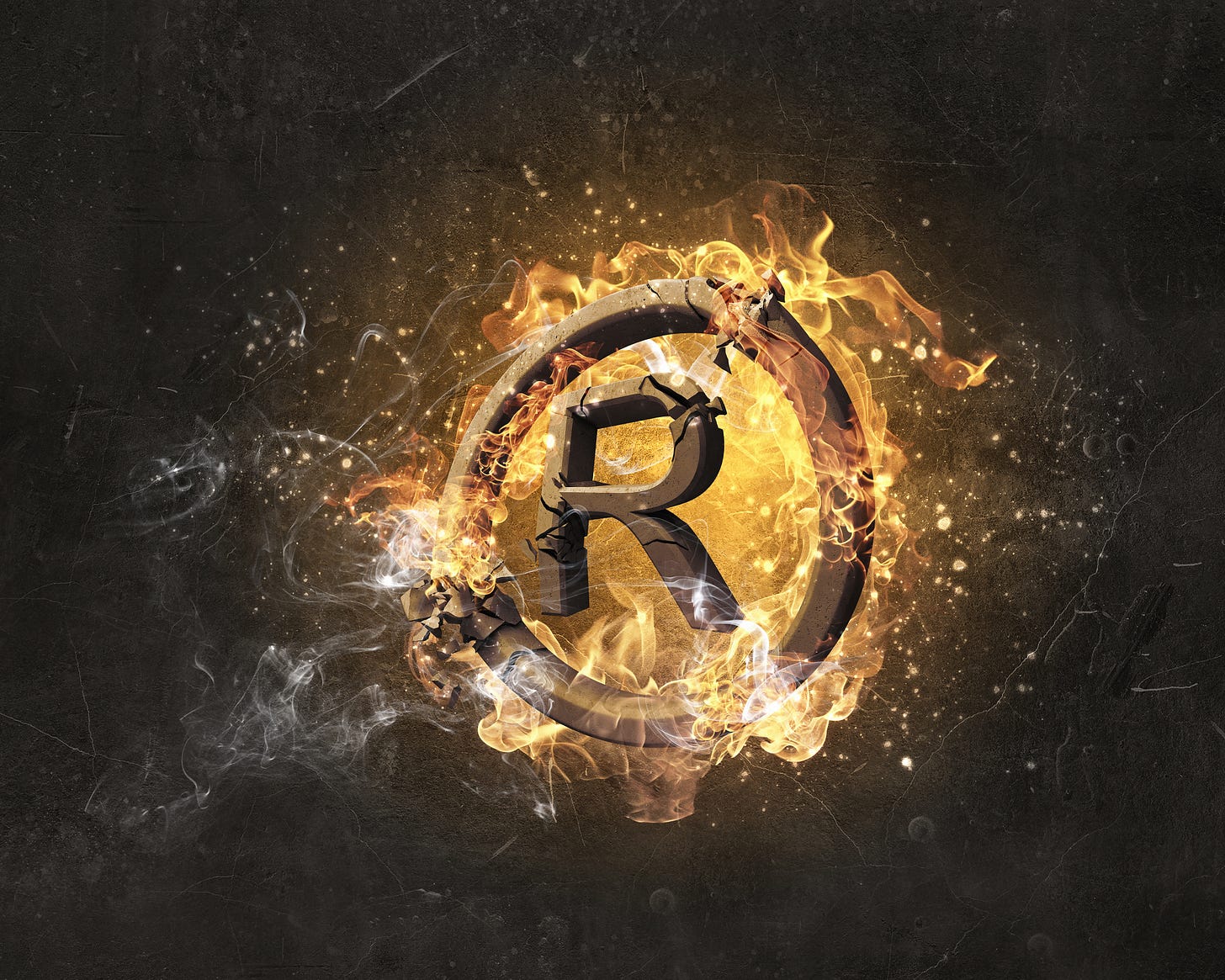Including Famous Brands in Fiction
A breakdown of trademark law when using brand names in fiction
Can I mention brand name products in my fiction?
The short answer is ‘yes’. However, it’s important to know how you’re using said brands to determine if you might be liable to legal action being taken against you.
I must preface that I’m not a lawyer, nor am I a legal expert. Some of the following information was derived from a blog post written in 2011 by Mark Fowler, a New York attorney with experience in the publishing industry, and a separate post by Daily Writing Tips from 2011 by Mark Nichol. It should also be stated that this is regarding United States Common Law, and may vary depending on your country of residence. I recommend following up with independent research on your specific situation, or consulting an attorney for the most up-to-date information.
This post will attempt to summarize what I’ve found during my own research on the subject for a story I’m writing. I’ve included other reputable sources linked in the article for additional context. I’ll also give examples of how I intend to use brand names.
Is it against the law to use brand names?
This could be a common misconception with writing fiction set in the real world. As I began writing a story last year, which included smoking cigarettes and lung cancer set in a real-world setting, and I added all sorts of brand names to make the story feel more real. Then I got paranoid.
I questioned whether or not I was even allowed to do that. I’d read enough fiction to know that other authors had done it previously (Stephen King, surely!), but had they been given permission to do so? Was it because they were traditionally published and had lawyers? Or was it because the publisher secured the rights to include the necessary branding? So many questions!
The bottom line is you’re free to use brand names in your fiction to any extent you’d like. It’s the risk of the very real possibility of being sent a cease-and-desist letter, or taken to court with a lawsuit, that a writer should ultimately be considering when publishing work that includes famous brands. Although, even that is unlikely to occur, but more on that later. First, let’s dive into areas of trademark law that concern fiction writers.
Areas of trademark law to consider when writing
Trademark infringement - According to Wikipedia, trademark infringement is the violation of the exclusive rights attached to a trademark without the authorization of the trademark owner or any licensees.
Why infringement rarely concerns authors: Since writing doesn’t generally produce a physical object (unless it’s a book), the ability to infringe upon another physical product is unlikely. In this case, if you were to name-drop a brand within your story, you’re utilizing “nominative fair use” since you’re simply referring to the brand in a manner that invokes the goods and services the brand is recognized for.
Trademark dilution - A trademark law concept giving the owner of a famous trademark standing to forbid others from using that mark in a way that would lessen its uniqueness.
How to avoid genericizing a brand: This is like saying you ‘googled’ something instead of ‘I used Google to search the internet’. The best way to avoid getting reprimanded (a letter requesting you to stop) for this type of trademark use is to simply capitalize the company/brand in question to make the reference to the company’s business less vague. Or simply omit it from your manuscript altogether.
Trademark tarnishment - According to LegalZoom, tarnishment is a subcategory of dilution, and is “when there is an association between a famous mark and another mark, and the association harms the reputation of the famous mark. Often, a negative association involves alcohol, criminal activity, sex or drugs.”
Why this matters: I’d like to specify that this is similar to our next case of defamation, but in the highly-specified context of one brand utilizing another brand in a way that tarnishes the stature of the second brand in a broader sense. For this to be found legally ‘damaging’, the court would have to determine the use by the first brand of the second brand was intentional, otherwise the court may order the user to stop associating the second brand with their lesser-known product. This may be less pertinent at a writing level, but potentially more applicable to the marketing side of things.
Trademark defamation - Also known more simply as ‘defamation’, or in our case ‘libel’, which is the written or visual form of defamation. Defamation is the act of communicating to a third party (a reader) false statements about a person (or brand) that result in damage to their reputation.
The one that affects writers the most: If a company, person, or brand determines that you are negatively referencing them in a story to your readers (the 3rd party in this case), then you may be subject to legal action by the company, person, or brand in question.
From Mark Fowler’s blog, he states that “if you are depicting brand name products or companies in an unsavory light in your novel or short story, it is often prudent to invent a fictional brand or a fictional company. If there is a compelling artistic reason to use real products and real companies in contexts that arguably disparage them, it is wise to seek advice, prior to publication, from your publisher's attorney -- or an attorney of your own -- on how best to minimize the legal risks.”
Defamation was definitely my main concern. I’d included famous cigarette brands in a story involving the main character’s subsequent cancer diagnosis. Even though it’s a well-known, studied correlation that smoking can lead to increased risk of cancer, I was worried that highlighting one brand over another might be misconstrued that I was stating as a “matter-of-fact” one manufacturer was more harmful than another. This would set me up for possible legal ramifications, therefore, I went with the tried-and-true method of creating a fictional brand that would take the full brunt of my potential disparagement.
I’d also like to mention that it’s within your right to simply alter the name of the brand you’re referring to in order to avoid being held liable. It’s also not necessary for you to attach the TM or R to the trademarked, or registered, term. That is mainly done in order to signify the intensity a company would like to project over the seriousness of how far they will go to protect their brand.
The nature of relative risk
I mentioned before that it was unlikely, even if you used a company’s brand in a disparaging way, that you’d face legal retribution. It should be noted that I don’t recommend doing it. The reason I say it’s “unlikely” is that each instance of this involves varying parameters that weigh into the metrics of the case.
For example, say I named a specific brand of cigarette in my story as being the cause of my character’s cancer diagnosis. As an author with a relatively small following on social media, the chance that the story would permeate the market to the extent it would damage the business of a major tobacco company and cause them to seek legal retribution over those damages is very slim. However, if someone like Stephen King, David Baldacci, Nora Roberts, Colleen Hoover (you get the idea) were to make the same exact assertion in one of their best-selling novels, it’d likely be within the company’s cross-hairs to take legal action.
That doesn’t absolve anyone of risk, but it’s why I’m confident in saying it’s relative to the writer or audience size of the publisher. If I were to be contacted by a lawyer, it would be less likely a charge seeking damage compensation, and more likely a call to cease using the name of their brand in the story.
In terms of fiction, there are other protections afforded to us in the sense that it can be deemed parody, or even fair use. But that’s open to interpretation and invokes the nature of ‘intent’ on behalf of the writer. That may need to be its own future post.
Final thoughts on using brand names
Some companies are ruthless when it comes to protecting their brand and intellectual properties. Therefore, I’d caution against using a brand name negatively, even if it’s parody. Please note that this isn’t legal advice; I’m simply relaying information I found publicly available on the internet.
Personally, the route I’ll be taking moving forward is referencing brand names sparingly, and only if it’s pertinent to the story being told. Otherwise, I’ll be altering the name somehow, or using a fictional brand in its place.
The good thing is that I’m no longer paranoid about using brand names. I hope that after reading this article, you aren’t as in the dark as I was. If it’s a benign reference to a company that promotes them, they’ll likely never notice due to the sheer amount of writing that is published online, or if they do, they might consider it free advertising. Just make sure to take the level of precaution you think is necessary to tell the story you want to tell. Or, better yet, contact an attorney for the best legal advice on the subject matter.
Happy writing! ~ WM
Winston Malone is a writer of fiction with aspirations of finishing the stories in his head, learning about the publishing industry, making "indie" work, and helping others along the way. If you’d like to chat, message him at storyletter@proton.me.









Thanks for the post, Winston! Also good to keep global audiences in mind. EU law is a bit more convoluted than the US and you can run afoul of copyright laws if you don't receive express permission to use logos or excerpts. I was warned by an editor that to use part of a TS Eliot poem in my book, I'd need to get permission from the estate!
As you say, it's about risk and the nature of the work you're producing.
Curious what other readers/writers think? Especially those from other regions of the world.
I was worrying about this just the other day with a story I'm working on! This was helpful, thank you!